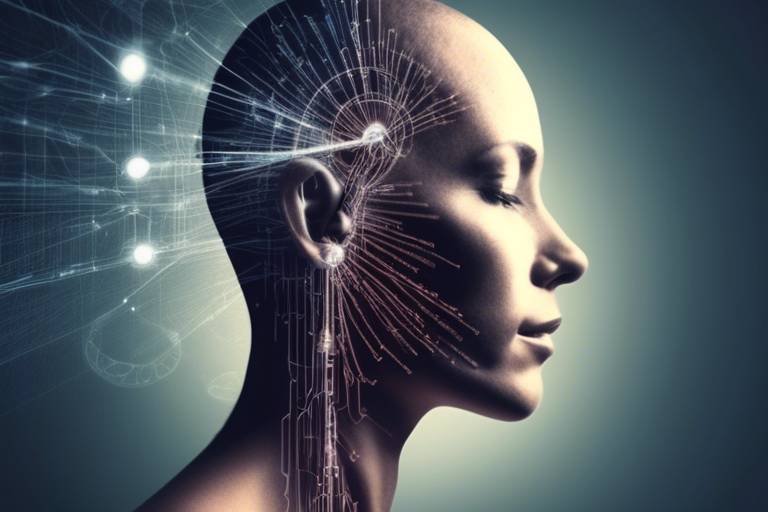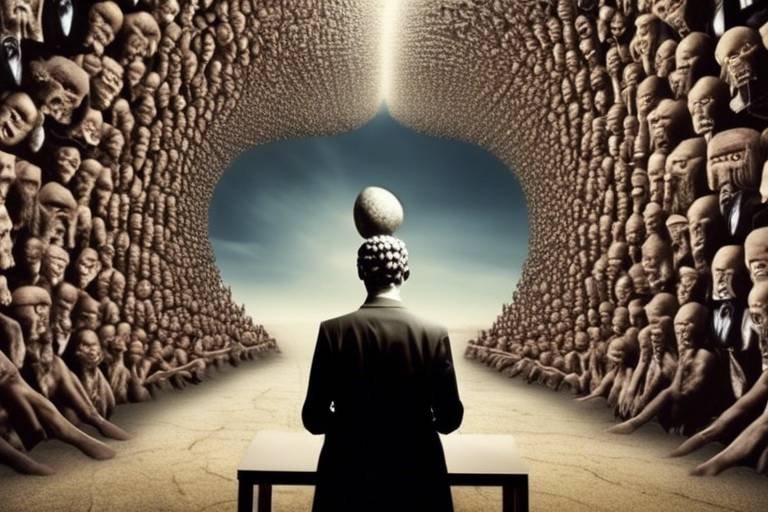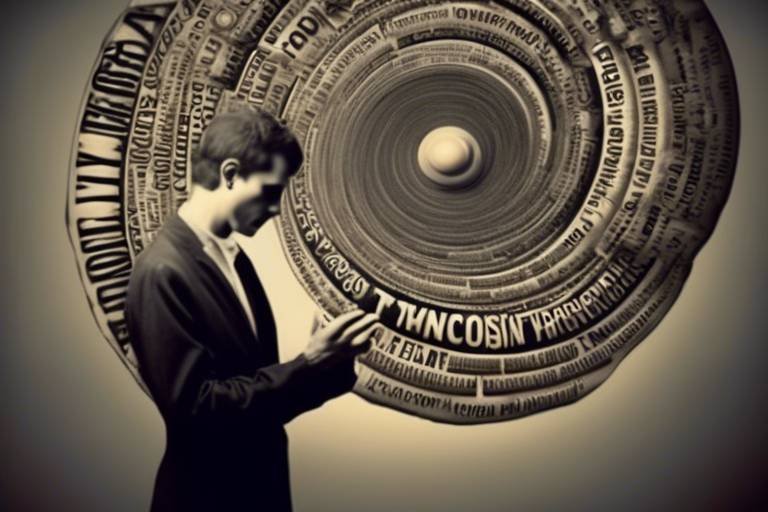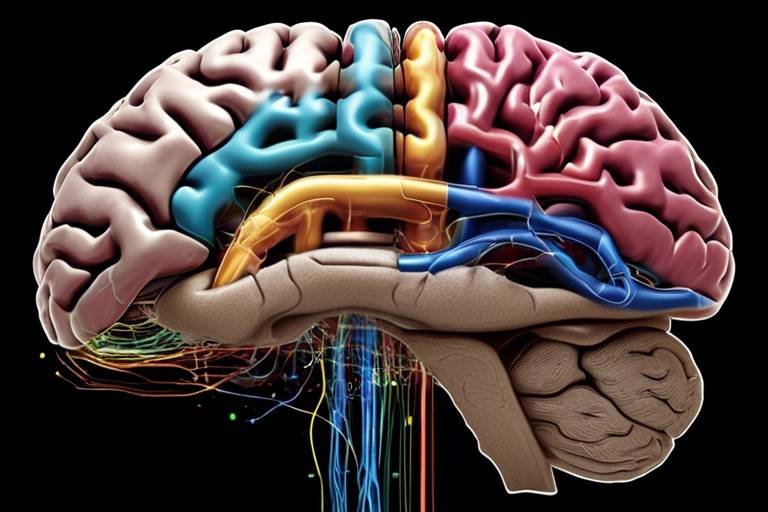Are the Mind and Consciousness the Same Thing?
The relationship between the mind and consciousness is one of the most intriguing puzzles in philosophy, psychology, and neuroscience. At first glance, it might seem like these two terms are interchangeable, but a closer look reveals a tapestry of complexities that challenge our understanding of human experience. Are they simply different labels for the same phenomenon, or do they represent distinct entities that interact in profound ways? This article aims to unravel these intricacies, taking you on a journey through historical definitions, philosophical debates, psychological insights, and scientific discoveries.
To start, let’s consider how we define the mind and consciousness. The mind can be thought of as the collection of cognitive faculties that enable us to think, perceive, and feel. It encompasses our thoughts, memories, emotions, and imagination. Consciousness, on the other hand, is the state of being aware of and able to think about one’s own existence, thoughts, and surroundings. It’s like the spotlight that shines on our mental processes, allowing us to experience life in a vivid and dynamic way.
As we delve deeper, we’ll explore how these concepts have evolved over time. For instance, ancient philosophers pondered whether the mind was a separate entity from the body, leading to the development of dualism. In contrast, modern perspectives often lean towards materialism, which posits that consciousness arises from physical processes within the brain. This ongoing dialogue raises essential questions: If the mind and consciousness are different, how do they interact? And if they are the same, what does that mean for our understanding of self and identity?
To navigate this intricate landscape, we will examine various philosophical, psychological, and neuroscientific perspectives. Each viewpoint adds a layer of understanding, revealing the rich tapestry of human cognition and awareness. By the end of this article, you will have a clearer picture of whether the mind and consciousness are indeed the same thing or if they represent unique aspects of our existence.
- What is the difference between mind and consciousness? The mind refers to the collection of cognitive functions, while consciousness is the awareness of those functions.
- Can consciousness exist without the mind? This is a debated topic; some argue that consciousness is a product of the mind, while others suggest that it may exist independently.
- How do philosophers view the mind and consciousness? Philosophers have various perspectives, with dualism emphasizing separation and materialism focusing on unity.
- What role does neuroscience play in understanding these concepts? Neuroscience investigates how brain activity relates to conscious experience, providing insights into the biological basis of the mind.
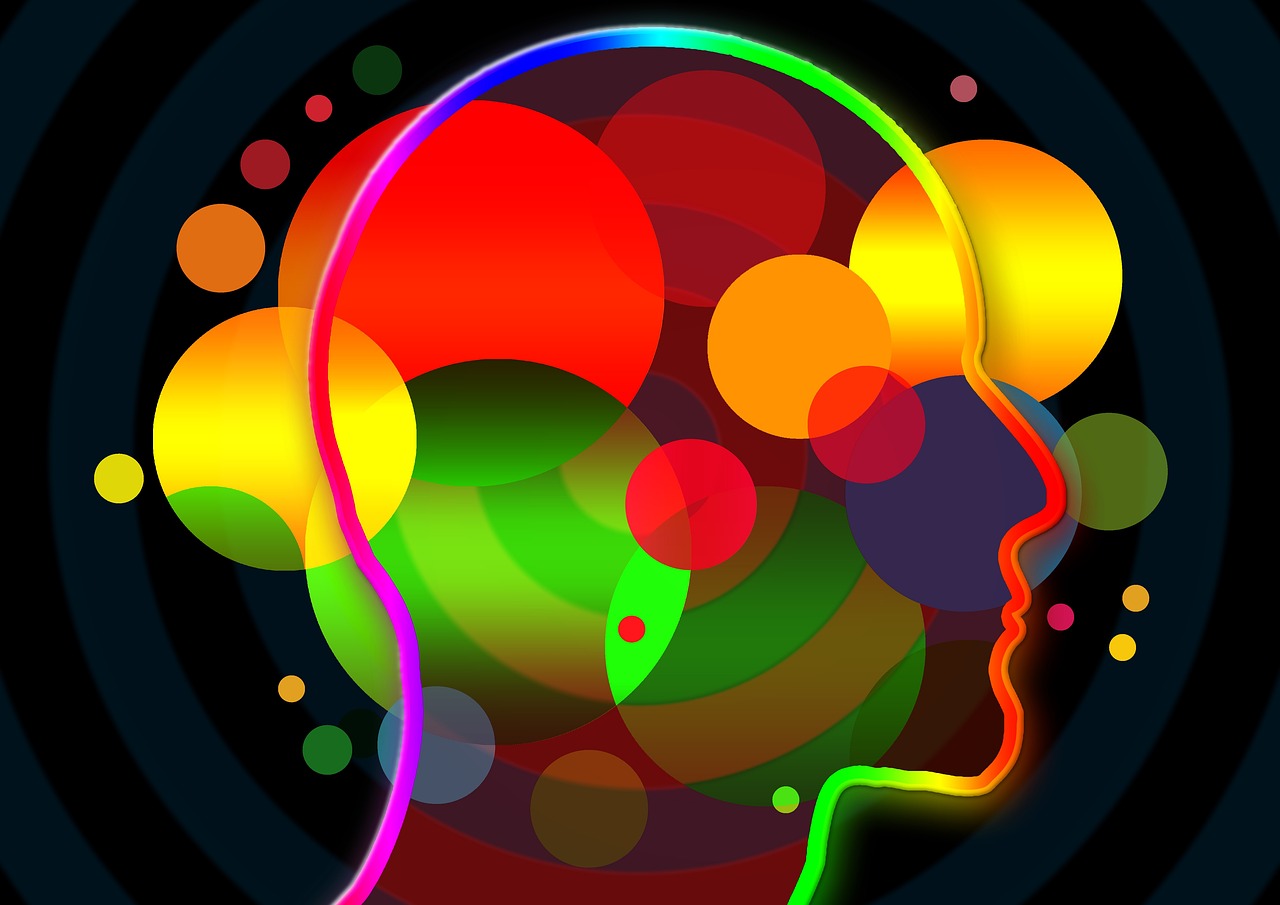
Defining Mind and Consciousness
To grasp the intricate relationship between mind and consciousness, we first need to untangle these two concepts, which have been the subject of intense debate and exploration across various disciplines. The mind is often described as the set of cognitive faculties that enable consciousness, perception, thinking, judgment, and memory. It’s like the software running on the hardware of our brain, orchestrating our thoughts and emotions. On the other hand, consciousness refers to the state of being aware of and able to think about one’s own existence, thoughts, and surroundings. It’s akin to the light illuminating the room of our mental processes, allowing us to perceive and interact with the world around us.
Historically, definitions of these terms have varied widely. Ancient philosophers like Plato and Aristotle proposed different interpretations, with Plato viewing the mind as a separate entity from the body, while Aristotle considered it a function of the body. In modern discussions, however, we often interpret the mind as encompassing both conscious and unconscious processes, which adds layers to our understanding of what it means to be 'conscious.'
In the realm of psychology, the mind is frequently analyzed through the lens of cognitive processes. This includes everything from decision-making to emotional regulation. Consciousness, in this context, is viewed as a spectrum, ranging from full awareness to altered states, such as dreaming or meditative states. To illustrate this complexity, consider the following:
| State of Consciousness | Description |
|---|---|
| Full Awareness | Engaging actively with the environment and processing information consciously. |
| Daydreaming | A state where attention drifts from the external environment to internal thoughts. |
| Sleep | A state of reduced consciousness, with varying levels of awareness and responsiveness. |
| Coma | A profound state of unconsciousness where a person cannot be awakened. |
As we delve deeper into the definitions, it’s essential to recognize that the mind is not merely a passive receiver of information but an active participant in shaping our experiences. It filters our perceptions and influences our reactions, often without our conscious awareness. This interplay raises an important question: can we truly separate the mind from consciousness, or are they two sides of the same coin? Understanding this relationship is crucial, as it impacts not only our philosophical inquiries but also practical applications in mental health and cognitive sciences.
In summary, while the mind and consciousness are often used interchangeably, they encapsulate distinct yet interconnected concepts that warrant further exploration. As we continue to unravel these definitions, we will uncover more about the essence of human experience and the fundamental nature of our existence.

Philosophical Perspectives
The relationship between the mind and consciousness has been a topic of intense debate among philosophers for centuries. At the heart of this discourse lies a fundamental question: Are the mind and consciousness separate entities, or are they intricately linked? Various philosophical perspectives offer different interpretations of this relationship, and understanding these viewpoints can enhance our grasp of human experience.
One of the most notable theories is dualism, famously championed by René Descartes. Dualism posits that the mind and body are distinct entities. Descartes famously stated, "I think, therefore I am," suggesting that the act of thinking is proof of one's existence and, by extension, the existence of a non-physical mind. This perspective has profound implications, as it implies that consciousness exists independently of the physical brain. However, dualism raises questions about how these two realms interact. If they are separate, how can a non-physical mind influence a physical body?
In contrast, materialism presents a compelling argument for the unity of mind and body. Materialists assert that everything about consciousness can be explained through physical processes in the brain. This perspective aligns with contemporary scientific approaches that seek to understand consciousness through the lens of neuroscience. For instance, advancements in brain imaging technology have allowed researchers to observe brain activity in real-time, revealing how specific thoughts and emotions correlate with neural processes. The materialist viewpoint suggests that consciousness is not a separate entity but rather an emergent property of complex brain functions.
Another philosophical stance is idealism, which posits that reality is fundamentally mental and that the material world is a construct of the mind. Idealists argue that consciousness is primary and that the physical world emerges from our perceptions and experiences. This perspective challenges the materialist view, suggesting that our understanding of reality is shaped by our consciousness rather than the other way around. Idealism raises intriguing questions about the nature of reality and whether we can ever truly know anything outside our conscious experience.
To summarize the philosophical perspectives on mind and consciousness, we can create a simple table that highlights the key positions:
| Philosophical Perspective | Key Concept | Implications |
|---|---|---|
| Dualism | Mind and body are separate entities | Challenges the understanding of interaction between mind and body |
| Materialism | Consciousness arises from physical processes | Supports scientific exploration of the brain and consciousness |
| Idealism | Reality is fundamentally mental | Questions the nature of reality and perception |
As we delve deeper into these philosophical perspectives, it becomes evident that the mind and consciousness are not merely abstract concepts but are central to our understanding of what it means to be human. Each viewpoint offers unique insights and raises critical questions about the nature of existence, perception, and reality. The ongoing dialogue among these philosophies continues to shape our understanding of the intricate relationship between the mind and consciousness.
- What is dualism? Dualism is the philosophical position that the mind and body are separate entities, with the mind being non-physical.
- How does materialism explain consciousness? Materialism posits that consciousness is a result of physical processes in the brain, emphasizing the unity of mind and body.
- What is the idealist perspective? Idealism argues that reality is fundamentally mental, suggesting that our perceptions shape the material world around us.

Dualism vs. Materialism
The debate between dualism and materialism has been a cornerstone of philosophical inquiry for centuries. At its core, this dichotomy addresses a fundamental question: Are the mind and body separate entities, or are they two sides of the same coin? Dualism, famously championed by philosophers like René Descartes, posits that the mind exists independently of the physical body. This perspective suggests that our thoughts, emotions, and consciousness are non-physical phenomena, perhaps even hinting at a spiritual dimension to human existence. In contrast, materialism argues for a more integrated view, asserting that everything about the mind can be explained through physical processes, particularly those occurring in the brain.
To better understand these two perspectives, let's break down their core tenets:
- Dualism: Emphasizes the separation of mind and body, suggesting that mental phenomena are distinct from physical processes.
- Materialism: Asserts that all mental states and consciousness arise from physical interactions, particularly within the neural networks of the brain.
Each viewpoint carries its own strengths and weaknesses. For instance, dualism provides a framework for discussing the subjective experience of consciousness—something that feels profoundly personal and often defies quantification. However, it struggles to explain how a non-physical mind interacts with a physical body. On the other hand, materialism, while grounded in scientific inquiry, can sometimes overlook the richness of subjective experience, reducing it to mere biological processes.
Consider this analogy: if the mind is like a symphony, dualism suggests that the music exists independently of the musicians and instruments, while materialism argues that the symphony is entirely dependent on the physical components that create it. This metaphor highlights a crucial point: if we view the mind as a product of the brain, we must grapple with how the nuances of consciousness arise from mere biological functions.
As we delve deeper into these concepts, it's essential to recognize that neither dualism nor materialism provides a definitive answer to the question of consciousness. Instead, they represent two distinct lenses through which we can explore the intricate relationship between mind and body. The ongoing discourse between these perspectives continues to shape our understanding of human experience, inviting further exploration and debate.
In the end, the clash between dualism and materialism invites us to reflect on our own beliefs about the nature of consciousness. Are we merely biological machines, or is there something more profound at play? This inquiry not only challenges our understanding of the mind but also compels us to consider the implications of our beliefs on our daily lives and interactions with others.
- What is dualism? Dualism is the philosophical position that the mind and body are distinct entities, with the mind existing independently of the physical brain.
- What is materialism? Materialism is the belief that everything, including consciousness, can be explained through physical processes and interactions within the brain.
- Which perspective is more accepted in modern science? While materialism is more widely accepted in contemporary scientific discourse, dualism still holds significant philosophical and cultural influence.
- Can dualism and materialism coexist? Some scholars argue that elements of both perspectives can coexist, suggesting a more nuanced understanding of consciousness that incorporates both physical and non-physical elements.

René Descartes' Influence
René Descartes, often referred to as the father of modern philosophy, profoundly influenced our understanding of the mind and consciousness. His famous declaration, "Cogito, ergo sum" (I think, therefore I am), encapsulates his belief that the very act of thinking is proof of existence. This assertion laid the groundwork for dualistic thinking, where the mind is seen as a separate entity from the body. Descartes argued that the mind, or the soul, is non-physical and distinct from the physical body, which he viewed as a machine operating in the physical world.
Descartes' dualism sparked significant debate and inquiry into the nature of consciousness. He posited that while the body is subject to physical laws, the mind operates under a different set of principles. This separation raised questions about how these two realms interact. For instance, how does a non-physical mind influence a physical body? This question remains a central theme in philosophical discussions about consciousness.
To further understand Descartes' influence, consider the following key aspects:
- Substance Dualism: Descartes proposed that there are two kinds of substance: mental and physical. This distinction suggests that the mind can exist independently of the body.
- Interactionism: He believed that the mind and body interact, particularly through the pineal gland, which he considered the "seat of the soul."
- Methodological Skepticism: Descartes employed doubt as a tool to strip away uncertainties, leading to foundational truths about existence and the nature of self-awareness.
Descartes' ideas have not only shaped philosophical discourse but have also influenced other fields, including psychology and neuroscience. His emphasis on introspection as a means of understanding consciousness paved the way for future explorations into the mind's inner workings. Even today, scholars reference Descartes when discussing the complexities of consciousness, often debating whether his dualistic framework can adequately explain our experiences.
In summary, René Descartes' influence on the study of the mind and consciousness is undeniable. His pioneering thoughts on dualism continue to provoke thought and discussion, challenging us to consider the intricate relationship between our mental and physical selves. As we delve deeper into the mysteries of consciousness, Descartes' legacy serves as a reminder of the philosophical roots that underpin our quest for understanding.

I think, therefore I am
This article explores the intricate relationship between mind and consciousness, examining philosophical, psychological, and scientific perspectives to understand if they are distinct entities or fundamentally intertwined.
To grasp their relationship, we first need to define what we mean by 'mind' and 'consciousness.' This section delves into various interpretations and meanings attributed to these concepts throughout history.
Philosophers have long debated the nature of mind and consciousness. This section reviews key philosophical theories, including dualism, materialism, and idealism, highlighting their implications for understanding these concepts.
Exploring the dichotomy between dualism, which posits a separation between mind and body, and materialism, which argues for their unity, this section examines the strengths and weaknesses of each viewpoint.
René Descartes' famous assertion, "I think, therefore I am", laid the groundwork for dualistic thinking. This statement encapsulates the idea that the very act of thinking is proof of one's existence. Descartes argued that while our bodies could be doubted, the mind's ability to think is undeniable. This perspective has profound implications for how we understand consciousness. It suggests that the mind operates independently of the physical body, sparking endless debates about the nature of reality and existence.
Descartes' dualism presents a fascinating dichotomy: on one hand, it champions the mind as a distinct entity capable of existing apart from the body; on the other, it raises questions about how these two interact. For example, how can a non-physical mind influence a physical body? This interaction remains one of the most perplexing challenges in both philosophy and science.
Moreover, Descartes' ideas paved the way for future thinkers to explore the essence of self-awareness and the subjective experience of consciousness. His work invites us to ponder: if thinking is proof of existence, what does that mean for those who cannot express their thoughts? This leads us to consider the implications of consciousness in various states of being, such as in comatose patients or individuals with severe cognitive impairments.
In contrast, contemporary materialism emphasizes the brain's role in producing consciousness. This part outlines modern scientific approaches that seek to explain consciousness through neurological processes. Unlike Descartes' dualism, contemporary materialists argue that mental states are entirely dependent on physical states of the brain. This raises exciting questions about the nature of consciousness and how it can be studied scientifically.
Psychology offers valuable insights into the mind and consciousness, focusing on cognitive processes, behavior, and emotions. This section discusses how psychological research informs our understanding of these concepts.
Neuroscience provides a biological perspective on the mind and consciousness. This section examines how brain activity correlates with conscious experience and the implications for our understanding of these phenomena.
Advanced brain mapping techniques, such as fMRI and EEG, have revolutionized our understanding of consciousness. This subsection discusses how these technologies reveal the neural correlates of conscious experience.
Studying disorders like coma and locked-in syndrome sheds light on the nature of consciousness. This part explores how these conditions challenge our definitions of mind and consciousness.
In conclusion, this section synthesizes the insights from various perspectives, addressing the question of whether mind and consciousness are synonymous or distinct, and what this means for our understanding of human experience.
- What is the difference between mind and consciousness? The mind typically refers to the collection of cognitive processes, including thoughts, memories, and emotions, while consciousness is the state of being aware of and able to think about one’s own existence and surroundings.
- Can consciousness exist without the mind? This is a heavily debated question. Some argue that consciousness is a function of the mind, while others believe it can exist independently.
- How do philosophers view the relationship between mind and consciousness? Philosophers have various perspectives, with dualists seeing them as separate entities and materialists viewing them as interconnected.
- What role does neuroscience play in understanding consciousness? Neuroscience investigates the biological underpinnings of consciousness, exploring how brain activity relates to conscious experiences.

laid the groundwork for dualistic thinking. This subsection discusses his contributions and how they shaped modern discussions around consciousness.
René Descartes, a prominent figure in the realm of philosophy, is often credited with laying the groundwork for dualistic thinking through his famous declaration, "Cogito, ergo sum" (I think, therefore I am). This phrase encapsulates the essence of his belief that the act of thinking is proof of one's existence and, by extension, the existence of a distinct mind separate from the body. Descartes posited that the mind is a non-physical substance, which exists independently of the physical body. This radical idea sparked a philosophical revolution, leading to the exploration of consciousness as a separate entity from the material world.
His contributions can be summarized in several key points:
- Mind-Body Dualism: Descartes argued for a clear distinction between the mind (the realm of thoughts and consciousness) and the body (the physical entity). This separation suggested that mental phenomena are non-physical and cannot be fully explained by physical processes.
- Rationalism: He emphasized the importance of reason and intellect in understanding human existence, which has influenced modern epistemology and the study of consciousness.
- Impact on Science: Descartes' ideas paved the way for later scientific inquiries into the nature of consciousness, encouraging thinkers to explore how the mind interacts with the body.
Descartes' dualism raised significant questions about the nature of reality and our understanding of consciousness. For instance, if the mind is separate from the body, how do they interact? This inquiry led to numerous philosophical debates, with thinkers like Baruch Spinoza and Gottfried Wilhelm Leibniz proposing alternative views that either merged or further distinguished the mind and body.
In contemporary discussions, Descartes' influence can still be felt. His ideas have prompted modern philosophers and scientists to investigate the complexities of consciousness, particularly in the context of neurological studies. The challenge remains: how do we reconcile the subjective experience of consciousness with the objective study of the brain? This ongoing dialogue reflects the profound impact of Descartes' work on our understanding of the mind and consciousness.
Ultimately, René Descartes' contributions have not only shaped philosophical thought but also laid a foundation for modern discussions around consciousness, prompting us to ponder the intricate relationship between our mental experiences and the physical world. As we continue to explore these concepts, we find ourselves at the intersection of philosophy, psychology, and neuroscience, each offering unique insights into the enigma of consciousness.

Contemporary Materialism
Contemporary materialism represents a significant shift in our understanding of consciousness, asserting that the mind is not a separate entity but rather a product of physical processes within the brain. This perspective aligns with the scientific method, encouraging researchers to explore the intricate workings of the brain through various methodologies. At its core, contemporary materialism posits that consciousness arises from complex neural interactions and that our thoughts, feelings, and experiences can be traced back to specific brain activity.
One of the primary advantages of this viewpoint is its reliance on empirical evidence. With advancements in technology, scientists can now observe the brain in action and correlate certain patterns of activity with conscious experiences. For instance, studies using functional Magnetic Resonance Imaging (fMRI) and Electroencephalography (EEG) have revealed how different areas of the brain activate during specific cognitive tasks. This has led to a deeper understanding of phenomena such as perception, decision-making, and emotional responses.
However, contemporary materialism is not without its challenges. Critics argue that while it effectively explains many aspects of consciousness, it may overlook the subjective experience that accompanies it. For example, the qualitative aspects of consciousness—often referred to as qualia—raise questions about whether materialist explanations can fully capture the richness of human experience. Can the sensation of tasting chocolate or the feeling of joy be reduced to mere neural firings? This debate continues to fuel discussions in both philosophical and scientific circles.
Moreover, contemporary materialism has implications beyond the realm of science. It influences how we perceive mental health, ethics, and even our understanding of free will. If consciousness is merely a byproduct of brain activity, what does that mean for concepts like responsibility and agency? This line of inquiry opens up a Pandora's box of ethical considerations, compelling us to rethink our views on mental illnesses, rehabilitation, and the nature of human existence.
In summary, contemporary materialism provides a robust framework for understanding consciousness through the lens of neuroscience. It emphasizes the importance of brain function in shaping our mental lives while also inviting us to grapple with profound questions about the essence of being human. As we continue to explore the depths of the mind, the dialogue between materialism and other philosophical perspectives will remain crucial in shaping our understanding of consciousness.

Psychological Insights
The relationship between the mind and consciousness is a complex tapestry woven from various threads of psychological research. To understand this intricate connection, we must first consider how psychologists define these concepts. Mind often refers to the collection of cognitive processes, including thoughts, memories, and emotions, while consciousness is typically seen as the state of being aware of and able to think about one's own existence, thoughts, and surroundings. This distinction sets the stage for a deeper exploration into how our mental processes shape our conscious experiences.
One of the most fascinating aspects of psychological research is the study of cognitive processes and how they influence our conscious awareness. For instance, consider the phenomenon of attention. When we focus on a particular task, our consciousness narrows, allowing us to filter out distractions. This selective attention is crucial for navigating our daily lives, as it helps us prioritize information and respond effectively to our environment. Yet, what happens when our attention is divided? Research has shown that multitasking can lead to decreased performance, revealing the limitations of our conscious awareness.
Moreover, emotions play a significant role in shaping our conscious experience. Psychologists have long studied the interplay between emotion and cognition, uncovering how feelings can influence our thoughts and decision-making processes. For example, when we feel anxious, our mind may fixate on potential threats, skewing our perception of reality. This emotional lens can significantly impact our conscious experience, affecting everything from our interactions with others to our overall mental health.
Another intriguing area of study involves the concept of unconscious processes. While we often think of consciousness as the tip of the iceberg, much of our mental activity occurs below the surface. The unconscious mind can influence our behavior and decisions in ways we might not even realize. For instance, have you ever made a snap judgment about someone without understanding why? This could be the result of unconscious biases formed through past experiences. Understanding these hidden influences is crucial for gaining a holistic view of the mind and consciousness.
Furthermore, psychological theories such as cognitive behavioral therapy (CBT) highlight the importance of recognizing and altering thought patterns to improve mental health. CBT encourages individuals to become aware of their thoughts and how these thoughts can impact their emotions and behaviors. By fostering this awareness, individuals can better navigate their conscious experiences and make more informed choices, ultimately leading to a healthier mind.
In summary, psychological insights into the mind and consciousness reveal a dynamic interplay between cognitive processes, emotions, and unconscious influences. By understanding these relationships, we gain a clearer picture of how our mental landscape shapes our conscious experience. The exploration of these concepts not only enriches our understanding of human behavior but also opens doors to new therapeutic approaches that can enhance mental well-being.
- What is the difference between mind and consciousness?
The mind encompasses all cognitive processes, including thoughts and emotions, while consciousness refers specifically to the state of being aware of these processes. - How do emotions affect consciousness?
Emotions can shape our conscious experience by influencing our thoughts and perceptions, often narrowing our focus based on how we feel. - Can unconscious processes influence our decisions?
Yes, unconscious processes can significantly impact our behavior and choices, often without our awareness. - What is cognitive behavioral therapy?
CBT is a therapeutic approach that helps individuals recognize and change negative thought patterns to improve their mental health.

Neuroscientific Approaches
Neuroscience has emerged as a pivotal field in unraveling the intricate relationship between the mind and consciousness. By examining the brain's structure and function, researchers are beginning to piece together how our thoughts, feelings, and experiences are generated. The quest to understand consciousness is akin to exploring a vast ocean; every new discovery reveals deeper layers and complexities that challenge our previous notions.
One of the most fascinating aspects of neuroscience is the correlation between brain activity and conscious experience. For instance, when we engage in a thought-provoking conversation or experience a moment of joy, specific neural pathways light up like a city skyline at night. This leads scientists to ask: Is consciousness merely a byproduct of brain activity, or is it something more profound? To answer this, various advanced techniques have been developed, allowing us to visualize and analyze brain functions in real time.
Among these techniques, functional Magnetic Resonance Imaging (fMRI) and Electroencephalography (EEG) stand out as revolutionary tools. fMRI measures brain activity by detecting changes in blood flow, revealing which areas of the brain are active during specific tasks. On the other hand, EEG captures electrical activity through electrodes placed on the scalp, providing insights into the timing and patterns of brain responses. Both methods have contributed significantly to our understanding of consciousness, laying bare the neural correlates that accompany various mental states.
| Technique | Description | Applications |
|---|---|---|
| fMRI | Measures brain activity by detecting blood flow changes. | Understanding brain functions during tasks, studying emotional responses. |
| EEG | Records electrical activity of the brain through scalp electrodes. | Analyzing brain waves, diagnosing sleep disorders, studying cognitive processes. |
Another significant area of study within neuroscience is the investigation of consciousness disorders. Conditions such as coma and locked-in syndrome present unique challenges to our definitions of mind and consciousness. For example, a person in a coma may appear unresponsive, yet advances in neuroscience suggest that some may retain a level of awareness. This raises profound questions about the nature of consciousness: Is it possible to be aware without being able to express that awareness? The exploration of these disorders not only enhances our understanding of consciousness but also emphasizes the need for a nuanced approach to the mind-body relationship.
Furthermore, the study of consciousness disorders has led to innovative therapeutic approaches. Techniques such as neurofeedback and cognitive rehabilitation are being explored to help individuals regain some aspects of consciousness. These interventions aim to tap into the brain's plasticity, illustrating that even in the face of severe injury, there remains a potential for recovery and growth.
In conclusion, the neuroscientific approach to understanding the mind and consciousness is a dynamic and evolving field. As technology advances and our knowledge deepens, we are likely to uncover even more surprising connections between brain function and conscious experience. This ongoing exploration not only informs our understanding of what it means to be human but also challenges us to reconsider the very nature of consciousness itself.
- What is the difference between mind and consciousness? The mind encompasses thoughts, emotions, and cognitive processes, while consciousness refers specifically to the state of being aware of one's thoughts and surroundings.
- How do neuroscientific methods help in understanding consciousness? Techniques like fMRI and EEG allow researchers to observe brain activity in real time, helping to identify which areas of the brain are involved in conscious experiences.
- Can consciousness exist without a functioning brain? This is a debated topic; some argue that consciousness is entirely dependent on brain activity, while others suggest that there might be aspects of consciousness that transcend physical processes.

Brain Mapping Techniques
Brain mapping techniques have revolutionized our understanding of consciousness by allowing scientists to observe the brain's activities in real-time. These advanced technologies provide a window into the intricate workings of the mind, helping us uncover how different regions of the brain contribute to our conscious experiences. Among the most notable techniques are Functional Magnetic Resonance Imaging (fMRI) and Electroencephalography (EEG).
fMRI measures brain activity by detecting changes in blood flow. When a particular area of the brain is more active, it requires more oxygen, leading to increased blood flow in that region. This technique allows researchers to create detailed maps that show which parts of the brain are engaged during specific tasks, such as solving a puzzle or recalling a memory. The beauty of fMRI lies in its ability to provide a spatial resolution that reveals the brain's structure while simultaneously capturing its dynamic activity.
On the other hand, EEG tracks electrical activity in the brain through electrodes placed on the scalp. It excels in providing a temporal resolution that captures brain activity in milliseconds. This makes EEG particularly useful for studying rapid cognitive processes, such as attention and perception. While fMRI can show where activity occurs, EEG helps us understand when it happens, creating a more comprehensive picture of how consciousness unfolds.
Both techniques have their strengths and weaknesses. For instance, fMRI is excellent for mapping brain regions but can be limited in capturing quick changes in brain activity. Conversely, EEG provides real-time data but lacks the spatial precision of fMRI. Together, they offer complementary insights into the complex relationship between brain function and conscious experience.
As researchers continue to refine these technologies, the potential for new discoveries about the mind and consciousness grows. Imagine being able to visualize how thoughts and emotions manifest in the brain, unlocking the secrets of our inner experiences. This ongoing exploration not only enhances our understanding of consciousness but also has profound implications for fields such as psychology, neurology, and even philosophy.
In summary, brain mapping techniques like fMRI and EEG are essential tools in the quest to understand consciousness. They allow us to explore the brain's inner workings, revealing the connections between neural activity and our conscious experiences. The future of consciousness research is bright, and as technology advances, we may soon unravel even more mysteries of the mind.
- What is the primary difference between fMRI and EEG?
fMRI measures blood flow to indicate brain activity, providing spatial information, while EEG measures electrical activity, offering temporal data.
- Can brain mapping techniques help with mental health conditions?
Yes, these techniques can provide insights into the brain's functioning in mental health disorders, potentially leading to better treatment options.
- Are there any risks associated with these brain mapping techniques?
Both fMRI and EEG are generally considered safe, with fMRI involving no radiation and EEG being non-invasive.
- How do researchers use brain mapping in studies of consciousness?
Researchers use these techniques to identify which brain areas are active during conscious experiences, helping to link specific functions to brain regions.

Consciousness Disorders
Consciousness disorders are fascinating yet challenging conditions that prompt us to rethink our understanding of what it means to be conscious. These disorders can range from states of minimal awareness to complete unresponsiveness, each providing unique insights into the nature of consciousness itself. For instance, conditions such as coma, locked-in syndrome, and vegetative states pose profound questions about the continuity of conscious experience. Are individuals in these states truly aware, or are they merely existing without any subjective experience?
In a coma, a person is unresponsive and cannot be awakened, yet brain activity can vary significantly. This state raises the question of whether any form of consciousness exists beneath the surface. On the other hand, in locked-in syndrome, individuals are fully aware but unable to move or communicate verbally due to complete paralysis of nearly all voluntary muscles. This condition highlights the disconnection between the mind and the body, making us ponder: What does it mean to be conscious if one cannot express it?
To further illustrate the complexities of consciousness disorders, consider the following table that outlines key differences between these conditions:
| Condition | Awareness | Responsiveness | Communication |
|---|---|---|---|
| Coma | No | No | No |
| Locked-in Syndrome | Yes | No | Limited (usually through eye movement) |
| Vegetative State | No | Yes (reflexive responses) | No |
These disorders not only challenge our definitions of consciousness but also emphasize the importance of neurological assessments. For example, advanced imaging techniques like fMRI can sometimes detect brain activity in patients diagnosed with locked-in syndrome, suggesting that their conscious experience may be far richer than previously thought. This discovery can be both enlightening and disheartening, as it suggests that individuals may be trapped within their own bodies, aware of their surroundings but unable to convey their thoughts or feelings.
Moreover, consciousness disorders invite us to explore ethical implications. If a patient is deemed to have no consciousness, is it justifiable to withdraw life support? These questions are not just philosophical; they have real-world implications that affect families, medical professionals, and the patients themselves.
In summary, consciousness disorders serve as a critical lens through which we can examine the relationship between mind and consciousness. They challenge us to consider not just the biological underpinnings of consciousness but also the subjective experiences that define our humanity. As we continue to study these disorders, we may uncover deeper truths about the mind's capabilities and the essence of conscious experience.
- What is the difference between a coma and a vegetative state?
A coma is a state of unresponsiveness where a person cannot be awakened, while a vegetative state involves wakefulness without awareness. In a vegetative state, patients may have sleep-wake cycles but do not exhibit signs of conscious awareness. - Can individuals in a locked-in syndrome communicate?
Yes, individuals in locked-in syndrome are often fully aware and can communicate through eye movements or blinking, although they cannot speak or move their bodies. - How do doctors assess consciousness in patients?
Doctors use various assessments, including neurological exams and advanced imaging techniques like fMRI or EEG, to evaluate brain activity and responsiveness.
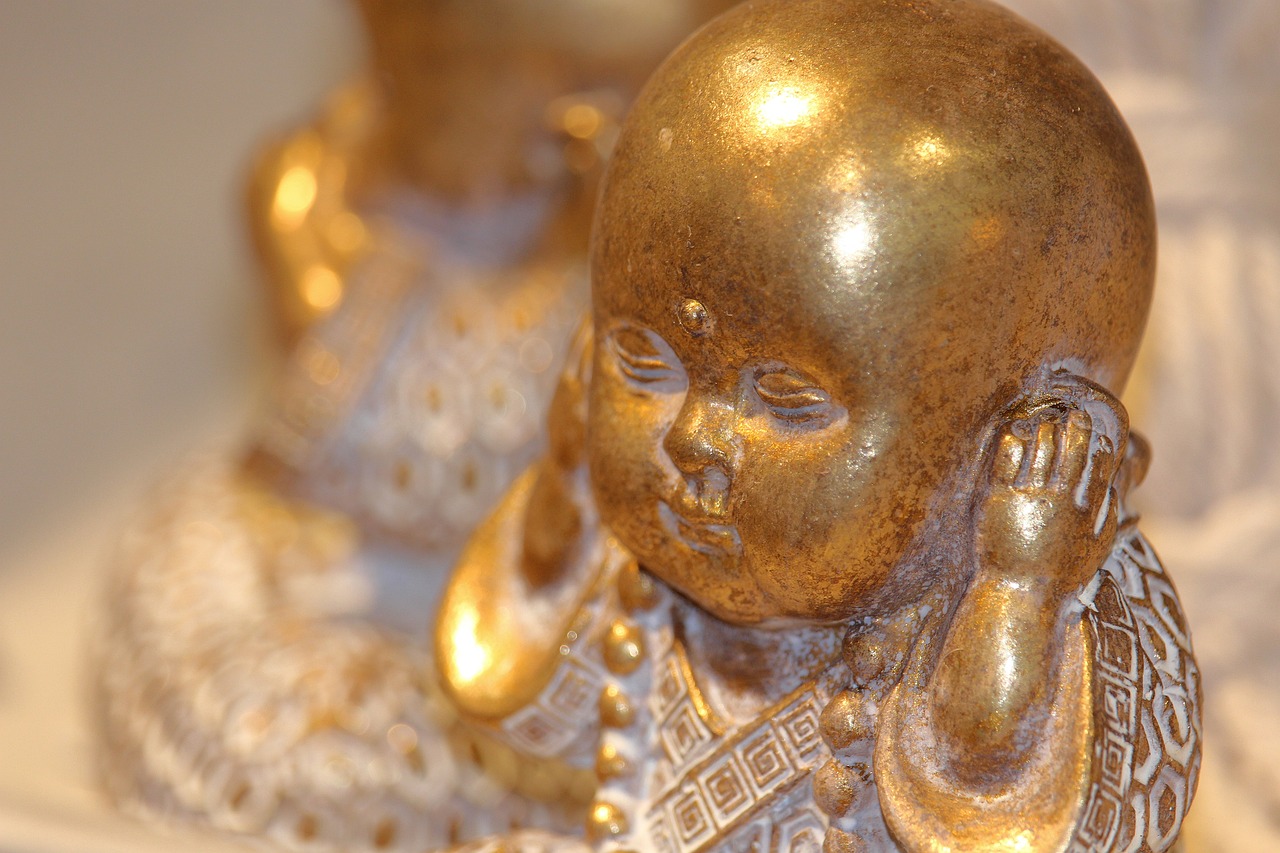
Conclusion: Are They the Same?
As we wrap up our exploration of the intricate relationship between the mind and consciousness, it's essential to reflect on the various perspectives we've encountered. The question of whether these two concepts are synonymous or distinct is not merely academic; it deeply influences our understanding of human experience and identity. Throughout history, thinkers have grappled with this question, leading us through a maze of philosophical, psychological, and neuroscientific insights.
On one hand, proponents of dualism argue that the mind and consciousness are separate entities, with the mind representing our thoughts and emotions, while consciousness serves as the awareness of those thoughts and emotions. This separation suggests a deeper complexity to human experience, implying that consciousness might exist independently of our physical brain. In contrast, the materialist perspective posits that consciousness is a byproduct of brain activity, fundamentally tying our mental experiences to the biological processes occurring within our skulls. This view simplifies our understanding but raises questions about the subjective nature of consciousness itself.
As we navigate through psychological insights, we find that cognitive processes and emotional responses are intertwined with our conscious experiences. The mind's activities influence our perception of reality, suggesting a dynamic relationship between the two. Neuroscience further complicates this picture, revealing how brain mapping technologies like fMRI and EEG illustrate the neural correlates of conscious experience. These findings hint at a more profound connection, where our mental activities are not just reflections of consciousness but integral components of it.
So, are the mind and consciousness the same? The answer may lie in embracing the complexity of both concepts. They are likely intertwined, each influencing and shaping the other. While we may not have a definitive answer, the ongoing dialogue among philosophers, psychologists, and neuroscientists continues to enrich our understanding. Perhaps, like two dancers in a beautifully choreographed routine, the mind and consciousness move together in harmony, each step revealing new layers of our human experience.
- What is the difference between mind and consciousness?
The mind typically refers to the collection of thoughts, emotions, and cognitive processes, while consciousness is the state of being aware of those thoughts and experiences. - Can consciousness exist without the mind?
This is a debated topic; dualists argue it can, while materialists believe consciousness is a product of the mind's processes. - How do neuroscience and psychology relate to the mind and consciousness?
Neuroscience studies the brain's physical aspects and their relationship to consciousness, while psychology examines how mental processes affect our conscious experience. - Is consciousness a purely biological phenomenon?
While many scientists argue that consciousness arises from biological processes, there are philosophical perspectives that suggest it may transcend mere biology.
Frequently Asked Questions
- What is the difference between mind and consciousness?
The mind typically refers to the set of cognitive faculties that enable consciousness, perception, thinking, judgment, and memory. In contrast, consciousness is the state of being aware of and able to think about one's own existence, thoughts, and surroundings. While they are related, they are not identical; the mind encompasses a broader range of processes, while consciousness is specifically about awareness.
- Are the mind and consciousness separate entities?
This is a hotly debated topic in philosophy and science. Dualists argue that they are separate, suggesting that the mind is non-physical and distinct from the body. Materialists, on the other hand, believe that consciousness arises from physical processes in the brain, indicating that they are fundamentally intertwined. Ultimately, the answer may depend on one's philosophical perspective.
- How do psychological theories contribute to our understanding of mind and consciousness?
Psychological theories provide insights into how cognitive processes, emotions, and behaviors shape our understanding of the mind and consciousness. By studying how we think, feel, and act, psychologists can reveal the underlying mechanisms that contribute to our conscious experiences, thus bridging the gap between abstract concepts and real-world behavior.
- What role does neuroscience play in studying consciousness?
Neuroscience plays a crucial role by examining the biological underpinnings of consciousness. Techniques like fMRI and EEG allow scientists to observe brain activity in real-time, helping to identify the neural correlates of conscious experience. This research sheds light on how specific brain functions relate to different aspects of consciousness.
- Can consciousness exist without the mind?
This question is complex and largely philosophical. Some argue that consciousness cannot exist without the mind, as the mind's processes are what create conscious awareness. Others suggest that consciousness could potentially exist in a more abstract form, independent of cognitive functions. However, this remains a topic of ongoing debate and exploration.
- What are consciousness disorders, and how do they inform our understanding of consciousness?
Consciousness disorders, such as coma or locked-in syndrome, provide critical insights into the nature of consciousness. Studying these conditions helps researchers understand the spectrum of conscious experience and what it means to be aware. They challenge our definitions of mind and consciousness, prompting deeper inquiries into the essence of awareness itself.
- Is there a consensus on the relationship between mind and consciousness?
Currently, there is no consensus on the relationship between mind and consciousness. Different philosophical, psychological, and neuroscientific perspectives offer varying interpretations. While some frameworks suggest a close relationship, others emphasize distinct separations. This ongoing dialogue illustrates the complexity of these concepts and the need for further research.








